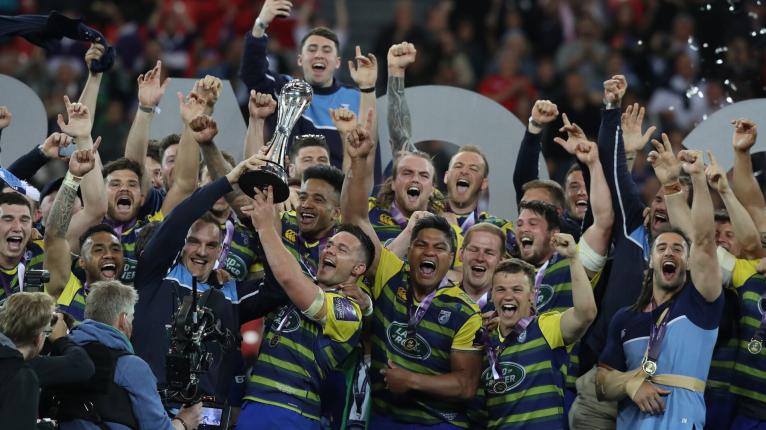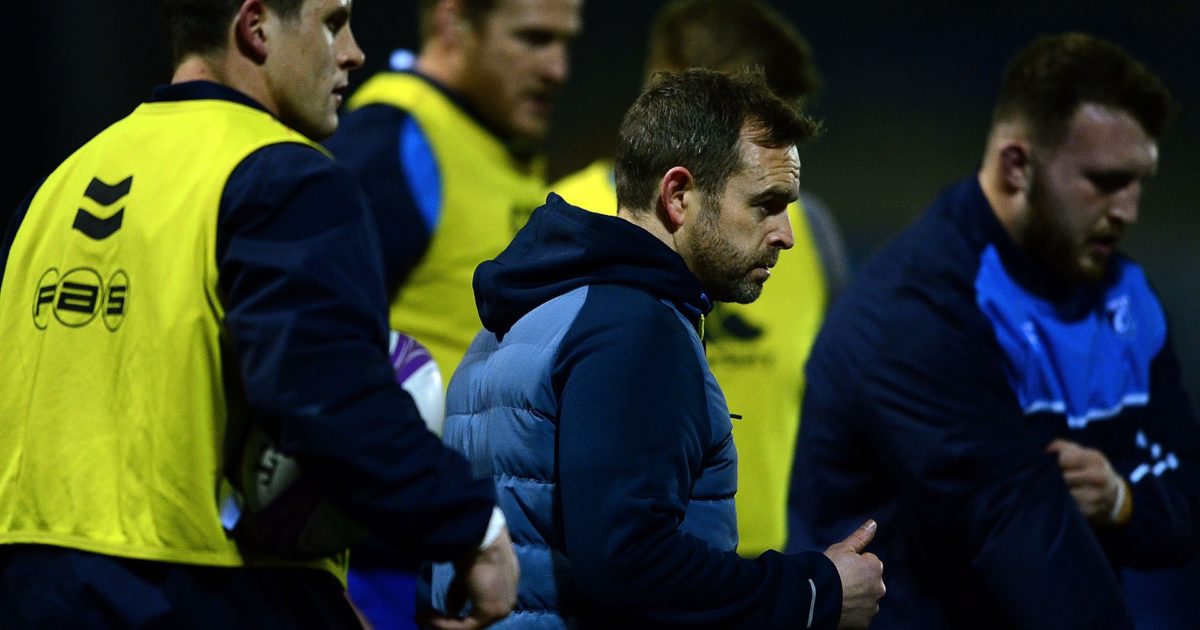Many fans feel deflated at Danny Wilson's appointment. They shouldn't

If you asked most Glasgow fans to come up with a list of the men they wanted to replace Dave Rennie when news of their head coach’s departure broke in November, it’s safe to say Danny Wilson’s name would not have featured prominently. Wilson doesn’t come with the awe of Rennie, the stature of Gregor Townsend, nor the glamour of any number of coaches the Scotstoun lot might have fantasised about.
The reaction among them to Wilson’s sideways shift from national forwards coach – a post he has held since 2018 – has been pretty lukewarm. Now that Glasgow sit where they do among the elite of the PRO14 and strive to make deeper inroads into the Champions Cup, there is a little anxiety about what Wilson brings to the party.
Does he have the clout to lure big names from abroad? Does he have the nous to outwit the heavyweights of the league? Warriors have reached a certain standard, has Wilson got enough about him to shunt them higher still? The optics of his appointment fuels the gnawing angst.
The perception is that with Rennie leaving and Wilson already on the payroll, Scottish Rugby have taken the cheapest route, not the best. What has been overlooked in this narrative is Wilson’s standing among those he has coached, the players he has nurtured and the achievements he has earned under significant constraints.
Blaine Scully, the ex-USA winger and captain, joined Cardiff Blues in 2015, the same season Wilson took the helm of a Welsh region embroiled in strife. It was his first – and so far only – job as a top-tier senior head coach and it was hardly a gentle baptism.
It's suddenly got very uncertain without Raelene…
https://t.co/DECvJM3omo— RugbyPass (@RugbyPass) April 23, 2020
Blues had finished tenth in the old PRO12 the previous campaign and had been booted out of the Challenge Cup by the Dragons. They were also buffeted by huge financial problems and uncertainty, and had ploughed through coaching team after coaching team.
“We were in rebuild mode. We’d had quite a bit of turnover in the region with a number of coaches and the playing squad had changed quite dramatically as well,” said Scully to RugbyPass. “Cardiff Blues had a rich history but hadn’t performed as well as they’d have hoped to. We both came in and bought into the ideas of the organisation’s rebuild and working towards what we believed Cardiff Blues could be. The growth we had year on year was very significant, we grew together, and Danny facilitated a lot of that.
“He’s a very detail-oriented, thoughtful coach, and his preparation and organisation were some of the main reasons we were able to stay focused and work through the challenging process that is a rebuild and do that in a collaborative way with the player group.”
Before moving to Cardiff at just 38, Wilson served a long apprenticeship on either side of the Severn. He was smart enough to recognise that he was unlikely to make the cut as a professional player himself, a dream that died altogether with a serious injury in his mid-20s, and turned to coaching.
He worked with the Blues academy players, took charge of London Welsh, was forwards coach at Bristol Bears who were tooling up for a tilt at promotion to the Premiership, a role he also held at the Scarlets and Dragons. He led Wales Under-20s to third place in the 2012 Junior World Championship, beating New Zealand for the first time at that level, and brought on young talent in the form of Cory Allen, Matthew Morgan, Tom Prydie and more.
What he inherited in the Welsh capital was an organisation in turmoil, the spectre of financial problems and off-contract players that only grew worse throughout his reign. Such was their grim budgetary predicament that in the summer of 2017, marquee signing Franco van der Merwe was moved on before playing a single game.
“There was a lot of uncertainty,” remembered Scully, who announced his retirement from playing last month after skippering the USA at the 2019 World Cup. “Who was going to stay and who wasn’t? A lot of folks were up for contract renewal or deciding what to do next. And then there were challenges with funding and what was or wasn’t available.
“Danny involved the players every step of the way, making it about us and what happened on the field, really supporting that focus. Regardless of whatever else was happening, could we stay tight as a group? We bought into a single purpose and that was the atmosphere Danny helped create.
"To the friends, teammates, opponents, coaches and fans, to the clubs and countries, and of course, the game itself, you have my deepest thanks for the experience of a lifetime." pic.twitter.com/H8Dmb6AkSL
— Blaine Scully (@BlaineScully1) March 10, 2020
“The more noise you have, sometimes the easier it becomes to focus. You really tunnel your vision and get collective impetus from the fact that we’re all in this together. It was effectively us versus the world at that point, or that’s how we positioned it. And then we just really cared about each other, doing well for each other and for our supporters. We made sure that however the journey ended, it ended with us giving everything.”
Against this backdrop of chaos, Wilson helped haul Blues up the league table, to seventh, seventh again, and then fourth in their conference after the expansion of the PRO12. He got them back into the Champions Cup after a five-year absence, playing some delightful rugby in the process.
But his crowning glory came in Bilbao in May 2018. It was the culmination of the region’s voyage, a pulsating Challenge Cup final triumph over Gloucester that meant Wilson departed on a wave of euphoria. Along the way, they claimed some serious scalps. A Toulouse team featuring Thomas Ramos, Cheslin Kolbe, Gael Fickou, Charlie Faumuina and Richie Gray was dispatched in the pool stage, along with Lyon and Sale Sharks. Richard Cockerill’s Edinburgh were castled at Murrayfield in the quarters and Pau put away in the semis.

“We just went through our process the week of the final and that’s what Danny is always really good at – his disciplined and consistent approach to the game, building in those routines and structures that really, for me, provide clarity,” explained Scully, who scored a vital late try in the final.
“He knew what he wanted in each respective area and was very organised. He trusted us as a player group at that point. As a head coach and a leader he had to make sure he was able to say what he needed to say. But we had a great deal of trust between us and that was part of the reason we were able to do what we did.”
There was a sense, continued the American, that Wilson blossomed along with his team. He was truly in the spotlight for the first time in his career and he left with his reputation as a free-thinker, man-manager and canny operator immensely enhanced.
We are pleased that Danny Wilson has agreed to join Glasgow Warriors next season. He brings significant Guinness PRO14 experience, has a European trophy to his credit, and international experience with Scotland. I’m really lookin…https://t.co/YARS64dgIN https://t.co/dZDyYq41lM
— Nathan Bombrys (@NBombrys) November 20, 2019
“Danny is still young in a lot of ways. He took on a job at a region that had a lot of things going on and had to balance that with on-the-job learning. It was a really cool experience reflecting on it now, where we were to where we grew to, and to the end of the 2018 season when we won the Challenge Cup.
“Danny’s journey was the same as a player’s, he continued to grow and be really curious. He was always learning as much as he could and working on his craft technically and tactically. We had lots of conversations around the team and we grew together.
“That is the fundamental priority of leadership, drawing everyone around you as you grow and develop yourself. It’s not always about being the person at the front of the room, although there are definitely elements of that. It’s about how do you grow everyone around you and start funnelling people towards a goal? That’s what we were able to do and that was our journey.
“Our standards were really important and making sure we were hitting them. Any coach needs to be prepared to say things aren’t good enough and he was definitely prepared to do that, but it wasn’t over the top.
“He had a pretty good balance as far as when to get on us, and a lot of that was built on the trust he had in players and our ability to get out in front of that. It’s a balancing act between empowering the players to be the standard-drivers and you making sure everyone is enforcing the right standards.”
























































